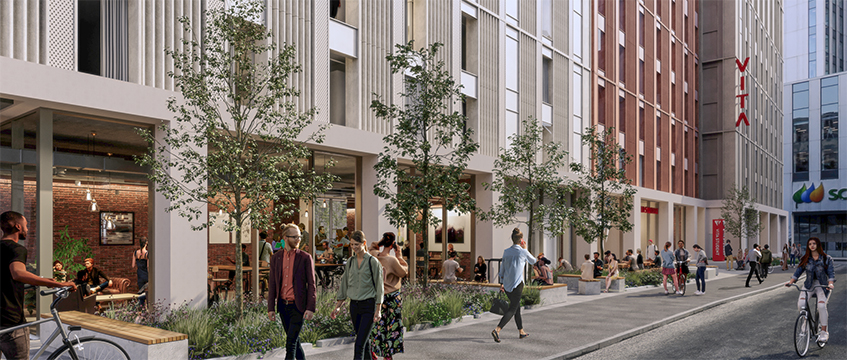R (on the application of Regas) v Enfield London Borough Council
Judge McKenna, sitting as a High Court judge
Local authority – Licensing – Houses in multiple occupation – Defendant local authority designating borough for additional licensing of houses in multiple occupation and selective licensing of private rented sector properties – Claimant objector applying for judicial review – Whether defendants failing to consult potentially interested parties – Whether defendants failing to consult for required period – Application granted
The defendant local authority took the decision, pursuant to their statutory powers under the Housing Act 1984, to designate their entire borough for both additional licensing of houses in multiple occupation (HMOs) and selective licensing of private rented sector (PRS) properties for a five year period from 1 April 2015.
The claimant was a private landlord with a long lease of a property located in the defendants’ area, which he rented out as a low rise HMO. He had attended meetings to express his opposition to the scheme and applied for a judicial review of the defendants’ decision. He contended that: (i) there had been a failure to consult potentially interested parties outside the borough, such as landlords and neighbouring local authorities, in breach of section 56 of the Housing Act 2004; and (ii) the defendants had failed to consult for the 10 weeks required by the secretary of state in his general approval issued as a condition of his approval for the additional and selective licensing schemes, with the result that neither scheme had the approval of the secretary of state, as required by sections 56(3) and 80(9) of the 2004 Act.
Local authority – Licensing – Houses in multiple occupation – Defendant local authority designating borough for additional licensing of houses in multiple occupation and selective licensing of private rented sector properties – Claimant objector applying for judicial review – Whether defendants failing to consult potentially interested parties – Whether defendants failing to consult for required period – Application granted
The defendant local authority took the decision, pursuant to their statutory powers under the Housing Act 1984, to designate their entire borough for both additional licensing of houses in multiple occupation (HMOs) and selective licensing of private rented sector (PRS) properties for a five year period from 1 April 2015.
The claimant was a private landlord with a long lease of a property located in the defendants’ area, which he rented out as a low rise HMO. He had attended meetings to express his opposition to the scheme and applied for a judicial review of the defendants’ decision. He contended that: (i) there had been a failure to consult potentially interested parties outside the borough, such as landlords and neighbouring local authorities, in breach of section 56 of the Housing Act 2004; and (ii) the defendants had failed to consult for the 10 weeks required by the secretary of state in his general approval issued as a condition of his approval for the additional and selective licensing schemes, with the result that neither scheme had the approval of the secretary of state, as required by sections 56(3) and 80(9) of the 2004 Act.
The defendants contended that relief should be refused in the exercise of the court’s discretion due to delay and because any benefit to the claimant of the relief would be outweighed by the disadvantage to others, given the scheme’s implementation.
Held: The application was granted.
(1) The 2004 Act imposed an obligation to take reasonable steps to consult people who were likely to be affected by the designation. The breadth of the specified group depended on the nature and extent of the proposed designation in any given case. In the present case, the class of persons likely to be affected by the designation had plainly included those residents, businesses, landlords and agents who had lived or operated in the immediately adjoining parts of other local authority areas. It was plain that those groups were to be affected and should have been consulted and no thought had been given, as it should have been, to the likely impact on those outside the borough who would be affected but had not been protected by the proposals. There was no justification for the defendants to treat people in the immediate vicinity, but who happened to be located outside the borough, differently from those within the borough. However, they had not been consulted in any meaningful way and, accordingly, the statutory precondition contained in section 56(3) of the 2004 Act had not been met.
(2) The statutory consultation requirement could not be satisfied by a general engagement and listening exercise, but required a draft proposal which would require some precision in the identification of what was to be designated and its consequences so that the extent of the effect on the people could be appreciated. In addition, it was hard to see how adequate steps could be taken to consult with the persons affected, unless they had known the likely licence conditions that would be imposed. The period of consultation had lasted much less that the 10-week period required to satisfy the conditions set out in the general approval. Further, it was plain that not all those who should have been consulted within the borough, never mind outside the borough, had been consulted for the whole of that period: R v Brent London Borough Council, ex p Gunning (1985) 84 LGR 168, R (on the application of Peat) v Hyndburn Borough Council [2011] EWHC 1739 (Admin) and R (on the application of Moseley) v Haringey London Borough Council [2014] UKSC 56 applied.
(3) The present case was not a straightforward, conventional consultation-based procedural fairness challenge, since the defendants’ jurisdiction to implement the scheme had been brought into question. In those circumstances, it was no answer for the defendants to plead either delay or say that it had started to implement the scheme so that there would be disruption if relief were granted. The implementation and operation of an unlawful designation was a continuing unlawful act which could be challenged by an affected landlord or any other claimant with the necessary standing. Alternatively, any landlord could simply refuse at any time in the future to apply for a licence and rely on the ultra vires nature of the designation as a defence if prosecuted. The administrative inconvenience with that course of action would be far greater. Therefore, taking into account all relevant matters, the court would exercise its discretion in favour of granting relief to the claimant: R v Brent London Borough Council, ex parte Walters (1998) 30 HLR 328 distinguished.
(4) Accordingly, the additional and selective licensing schemes had not been lawfully designated, nor could they lawfully be implemented unless and until the defendants had conducted a lawful consultation, as required by sections 56 and 80 of the 2004 Act; and, having done so, obtained approval for a lawfully designated scheme, whether specific confirmation from the secretary of state or under the general approval.
Jonathan Manning and Justin Bates (instructed by public access) appeared for the claimant; Kelvin Rutledge QC and Sian Davies (instructed by Enfield London Borough Council) appeared for the defendants.
Eileen O’Grady, barrister
Click here to download the transcript R (on the application of Regas) v Enfield London Borough Council










